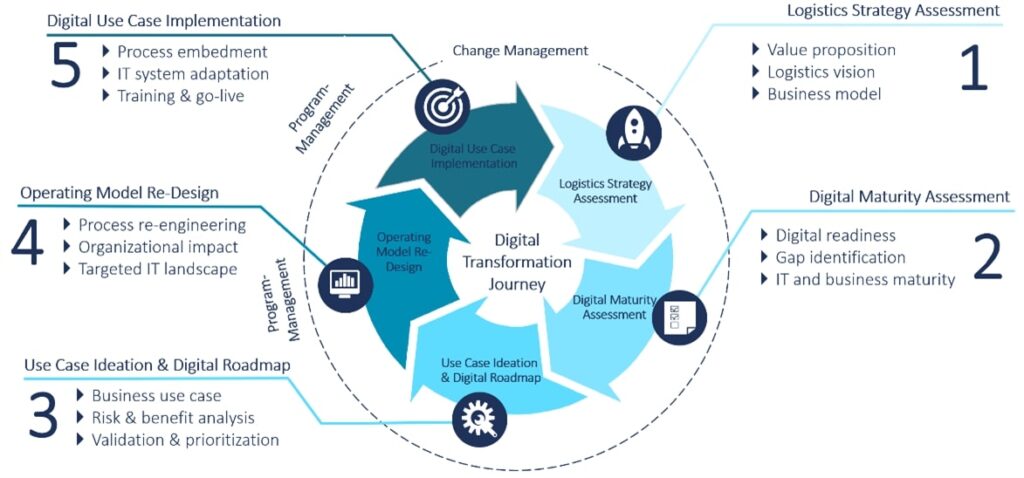
Product Excellence Through Modern PLM in Fast-Paced Markets
Modern PLM systems empower businesses to achieve product excellence in fast-paced markets by enhancing collaboration, agility and innovation.
Over the last decade, digital transformation has been changing the logistics business comprehensively. More and more digital technologies are introduced by a broad variety of stakeholders – ranging from global logistics service providers, software, and tech-enterprises to small innovative start-ups.
Relevant technologies range from tangible solutions for improved supply chain execution like autonomous picking robots or last-mile aerial drones to non-tangible data driven solutions like cloud-based visibility or partner collaboration platforms that increase operational excellence, and thus add significant value to the entire logistics chain.
One thing is clear: digital technologies must bring tangible benefits in specific business use cases. Most digital technologies promise an increase of profit, service level and ultimately a decrease of costs. Whereas other technologies even create totally new business models and therefore offer new revenue potentials. Finding the right digital use cases for a specific challenge and entering on the most promising digital transformation path is nowadays a big challenge for companies.
As an expert for digital value chain management, Camelot is considered as a frontrunner for new technologies in logistics and supply chain management. In a recent expert talk with leading specialists from industry and academia about digital transformation in supply chain management, Artificial Intelligence (AI) has been identified as a key driver of digital transformation in logistics. This is mainly due to the immense amount of structured and unstructured data that exists in this area. However, when properly used with digital technologies, this can elevate logistics operations to the next level! When asked for the main advantages, our experts rate lower costs and increased flexibility as the most likely benefits of artificial intelligence in logistics. Moreover, 76% of our experts consider transport management as the main field of application, followed by 59% for inventory management.

Overall, scanning the logistics market, reveals that there is many technologies already available today and further technologies are continuously entering the market at high speed. Thus, executives do not only face important strategic choices about how to take advantage of those fast-moving technology innovations but also how to adapt their current businesses to this ever-changing digital world.
Digital transformation in logistics has just started and will further change the way of logistics operations by impacting processes or even business models. To maintain or even increase the competitiveness in future, organizations need to continuously monitor and evaluate digital solutions. In other words, identifying the right technological innovation is not only key to create further business value but will also help you to become a digital frontrunner.
Camelot helps you master this challenge. As leading experts in the implementation of digital technologies in logistics, we always have the latest digital trends in mind when developing individual solutions for our customers. Based on a joint assessment of the status quo of your strategic logistics requirements and your digital maturity level, we help you define the right digital transformation path, covering process, IT, and organizational aspects. We accompany you along the entire digital transformation journey. From strategy to results – from vision to implementation.

To find out more, please contact our expert team!
We would like to thank Dr. Sebastian Kapser for his valuable contribution to this article.

Modern PLM systems empower businesses to achieve product excellence in fast-paced markets by enhancing collaboration, agility and innovation.

Read how the Campaign Planner & Designer (CPD) helps you to manage supply chain variability.

Explore automated production planning with our Campaign Planner & Designer.

The pharma market trends impact logistics with a shift to smaller, higher-value shipments and new temperature requirements.
© Camelot Management Consultants, Part of Accenture